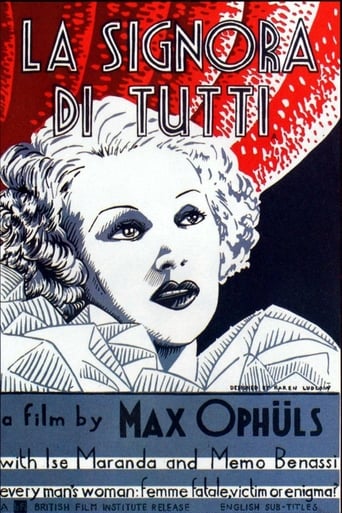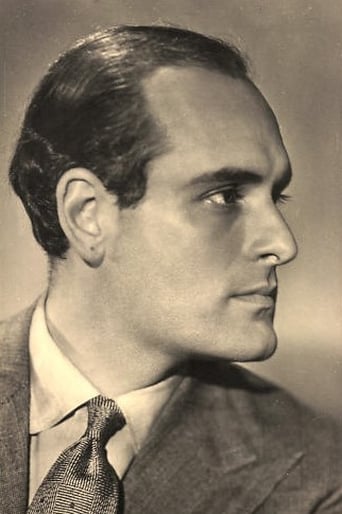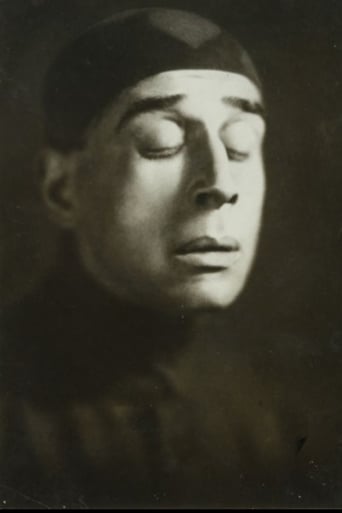Beystiman
It's fun, it's light, [but] it has a hard time when its tries to get heavy.
Ogosmith
Each character in this movie — down to the smallest one — is an individual rather than a type, prone to spontaneous changes of mood and sometimes amusing outbursts of pettiness or ill humor.
Kirandeep Yoder
The joyful confection is coated in a sparkly gloss, bright enough to gleam from the darkest, most cynical corners.
Billy Ollie
Through painfully honest and emotional moments, the movie becomes irresistibly relatable
happytrigger-64-390517
Max Ophüls directed so many masterpieces with great actor direction in great and sad love stories. All that shot with a virtuoso camera (travellings or real time shots like in "Madame De" or "Letters From An Unknown Woman").All these masterpieces are available. But there is one hidden masterpiece directed by Max Ophüls and it is one of his first movie : "La Signorra Di Tutti", only available in Italy (where it was shot, Ophüls was an international director). And it is an incredible masterpiece with again some virtuoso cinematography and narration (flashbacks in flashbacks). It is a powerful love drama with insane scenes.Sure Orson Welles watched it and provided him so many ideas. And 20 years later, Ophüls directed his most well known movie, "Lola Montès", with the same story.It is urgent to release this hidden treasure for real cinema lovers.
genet-1
This overblown romance prefigures such Hollywood melodramas as WRITTEN ON THE WIND, but, like Douglas Sirk's tale of life among the oil aristocracy, is redeemed by technique, in this case Ophuls' spirited use of moving camera. Everyone in the cast chews the curtains with appetite, particularly Isa Miranda as Gaby, the neurasthenic movie star who, following one of her many collapses in the course of the film, re-experiences the key event of her life, an unhappy love affair with married magnate Leonardo which led to the accidental death of his invalid wife, and Gaby's subsequent guilty breakdown. Nobody tracked or craned the camera with more flair than Ophuls, and he uses both techniques expertly in this film, often, it seems, for no motive more weighty than simple glee at his expertise. An insignificant conversation between Gaby in a rowboat on a sun-lit lake and Leonardo driving his convertible along the bank is elaborately staged as two long tracking shots, with Ophuls intercutting between them. Similar flair marks the death of wheelchair-bound Alma, her shadow racing ahead of her along the floor as she pushes her chair to the head of the stairs, then teeters and falls. Other sequences are too spasmodic, in particular those at the film studio, with Gaby's cliché cigar-chewing agent negotiating a new contract with the equally stock studio head, and,later, Leonardo facing a hostile board that attacks him for neglect of the company. Miranda is at her febrile worst in this film, and it demands considerable suspension of disbelief to accept as her married lover the overweight and stolid Memo Benassi, whose primary acting technique is to stare into the middle distance and fire up another cigarette. But any enthusiast for Ophuls' fluid camera will find the film a delight.
Mario Naito
Signora di tutti is truly one of the most underrated films of movie history. When I saw it ten years ago I was marveled about its modernity although belonging to 1934. I´m sure Welles undoubtely watched it before filming Citizen Kane, because Max Ophuls´s narration and editing techniques in that picture somehow anticipated Orson´s landmark screen jewel. This movie deserves a standout place in the development of film language.
Kalaman
"La Signora di Tutti" is the only film the maestro Max Ophüls made in Italy and it already confirmed his genius. The film - an eloquent and often tragic study of an ill-fated movie star Gaby Doriot who rises her way to a depressingly patriarchal world and later becomes a victim of its cruelty - is certainly nowhere near the richness, splendour, and lilting mastery of Ophüls' celebrated later classics, but it is fascinating in its own ways. The intricate flashback structure and the beautiful Isa Miranda's heartbreaking incarnation of the spoiled Gaby seem to anticipate Ophüls' later works, particularly his final masterpiece, "Lola Montes" (1955). The film is apparently not for every taste but if you are a fan of Ophuls as I am, it is an indispensable viewing.






